Civil Liberties, Criminalizing Dissent, Gaza, Human Rights, Iraq War, Political Prisoner, Prison Industry, Surveillance, Targeting Muslims, Torture, Truth to Power, War Resister
Podcast: Play in new window | Download

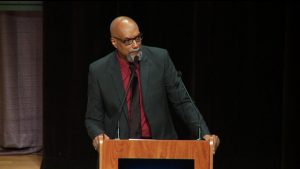
Green Party Vice Presidential Candidate Ajamu Baraka
Here on Law and Disorder we continue our interviews with candidates other than the two major parties. This week we talk with Green Party Vice Presidential Candidate Ajamu Baraka.
Guest – Ajamu Baraka is a longtime activist, veteran of Black Liberation Movement, Human Rights defender, Former founding director of US Human Rights Network, currently Public Intervenon for Human Rights with Green Shadow Cabinet, member of Coordinating Committee of Black Left Unity Network and Associate Fellow at IPS. He’s on a long time board member of the Center for Constitutional Rights and a human rights defender whose experience spans three decades of domestic and international education and activism, Ajamu Baraka is a veteran grassroots organizer whose roots are in the Black Liberation Movement and anti-apartheid and Central American solidarity struggles. Black Agenda Report
—-


The Connecticut Four
More than ten years ago four librarians in Connecticut fought back after FBI agents handed them National Security Letters seeking library records under the PATRIOT Act, and warned them it was a criminal offense to discuss it with anyone. The letter demanded that the librarians identify patrons who had used library computers online at a specific time a year earlier. Four librarians challenged the legality of the request in a lawsuit, represented by the ACLU. A year later the government withdrew the demand for information and the gag order. The media dubbed them “the Connecticut Four.”
Recently they have reunited to draw attention to attempts by the U.S. Senate to expand the amount and kinds of information that the government may compel libraries and others to divulge. It could force librarians to give the FBI transaction records, such as email metadata, links clicked on to access other websites and the length and time of Internet search sessions.
Guest – George Christian, executive director of the Library Connection and one of the four Connecticut librarians gagged by the FBI. The four librarians, members of the Library Connection, sought help from the ACLU after the FBI demanded patron records through a National Security Letter.
—-

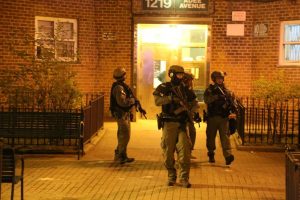
The Bronx 120
Just before 5 in the morning on April 27, 700 law enforcement officers conducted the largest gang raid in NY history in the Williamsbridge section of the North Bronx. Prosecutors used the 1970 RICO Act, and 78 young men averaging 24 years in age were arrested and indicted 120 on conspiracy charges. All are being detained collectively for 8 murders and firearms and drug charges dating back two decades. In one apartment, more than a dozen police threw flash-bang grenades and broke down the front door with assault weapons aimed at Paula Clarke and her two daughters, then forced them to crawl down their hall on all fours toward the officers.
At a press conference, police characterized the young men as “the epitome of organized crime today.” Cooperating federal agencies included the DEA, the ATF, the US attorney general, and ICE’s Homeland Security Investigations. Community members question this portrayal, saying the young men were not highly organized gangsters terrorizing a community; they lacked money and weapons and were living at home with their parents.
Critics claim that applying RICO to to street gangs has racist implications. Under RICO, individuals can be found guilty by association. Despite gang-related crime accounting for less than 2 percent of city crime, two weeks after the raid, James O’Neill, now NYPD Commissioner, promised 20 more raids before July 4.
The department quadrupled its gang division by launching Operation Crew Cut in 2012. A 2014 initiative has spent over $64.6 million on surveillance cameras and singled out 15 projects as high-crime zones; at least ten of those projects have experienced police raids.
Guest – Cindy Gorn is a former teacher of Urban Studies at Hunter College and a member of the Incarcerated Workers Organizing Committee.
CIA Sponsored Terror, Civil Liberties, Criminalizing Dissent, Gaza, Guantanamo, Habeas Corpus, Human Rights, Iraq War, NSA Spying, Prison Industry, Surveillance, Targeting Muslims, Truth to Power, War Resister
Podcast: Play in new window | Download
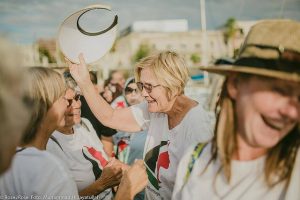

Women’s Boat To Gaza: 2016
When the Zionist settlers colonized Palestine they removed 750,000 natives in 1948 and more in the 1967. Many Palestinians fled to Gaza where 1,900,000 people live in a 5 x 25 mile strip of land in the Mediterranean Sea south of Israel. Gaza is completely blockaded by the Israeli army, Air Force and Navy. The 25 mile stretch of land has been called the largest open air prison. In 2012 the Israeli Army and Air Force attacked Gaza killing several thousand people, including more than 500 children and destroyed many buildings and the infrastructure of the area like hospitals, schools and the water purification plant. Because of the Israeli blockade, Gaza has yet to be rebuilt.
Ann Wright was on the boat Zaytouna-Oliva as part of the women’s boats to Gaza project. It sailed 1,715 miles from Barcelona Spain to Corsica to Sicily and on towards Gaza. However, the boat was seized by the Israeli Navy on October 5, 2016. They were in international waters 34 miles from Gaza when they were illegally apprehended by the Israeli Navy, taken to Israel, and deported. On board were 13 women from various countries whose mission was to bring hope to the people of Gaza and show they are not forgotten. Ann joins us today to talk about this courageous endeavor of hope and peace. She’s a retired Army Colonel and diplomat who resigned after the beginning of the war on Iraq. She has since devoted herself to the peace movement.
Guest – Ann Wright is a 29-year US Army/Army Reserves veteran, a retired United States Army colonel and retired U.S. State Department official, known for her outspoken opposition to the Iraq War. She received the State Department Award for Heroism in 1997, after helping to evacuate several thousand people during the civil war in Sierra Leone. She is most noted for having been one of three State Department officials to publicly resign in direct protest of the 2003 Invasion of Iraq. Wright was also a passenger on the Challenger 1, which along with the Mavi Marmara, was part of the Gaza flotilla. She served in Nicaragua, Grenada, Somalia, Uzbekistan, Kyrgyzstan, Sierra Leone, Micronesia and Mongolia. In December, 2001 she was on the small team that reopened the US Embassy in Kabul, Afghanistan. She is the co-author of the book “Dissent: Voices of Conscience.” She has written frequently on rape in the military.
—-
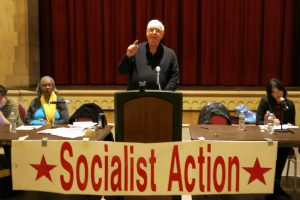
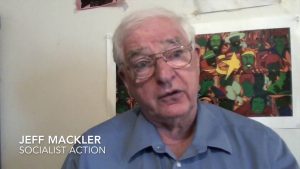
Jeff Mackler : U.S. Presidential Campaign Gains Support
Law and Disorder will be broadcasting interviews with candidates other than the two major parties. We check in with Jeff Mackler who is the National Secretary of Socialist Action and their 2016 presidential candidate. Jeff Mackler is the author of 25 books and pamphlets on a range of key social, economic and political issues. He’s a lifelong anti-war and anti-racist activist and a leader of the United Anti-War Coalition.
Guest – Jeff Mackler, is the National Secretary of Socialist Action and Socialist Action’s candidate for president in 2016. Mackler is the author of some 25 books and pamphlets on a range of key social, political and economic issues, a lifelong antiwar and anti-racist activist, a leader of the United National Antiwar Coalition and founder of the Northern California Climate Mobilization.
CIA Sponsored Terror, Civil Liberties, Climate Change, Criminalizing Dissent, Crony Capitalism, Cuba, Death Penalty, Extraordinary Rendition, FBI Intrusion, Gaza, Green Scare, Guantanamo, Habeas Corpus, Human Rights, Hydraulic Fracturing, Impeachment, Iran, Iraq Veterans, Iraq War, Military Tribunal, NSA Spying, Political Prisoner, Prison Industry, Prosecution of the Bush Administration, Supreme Court, Surveillance, Targeting Muslims, Torture, Truth to Power, War Resister
Podcast: Play in new window | Download

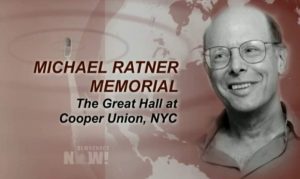
¡Michael Ratner Presente!
We hear excerpts from Michael Ratner’s public memorial held in the Great Hall at Cooper Union in Manhattan, New York. It would have been Michael’s 73rd birthday on June 13, 2016.

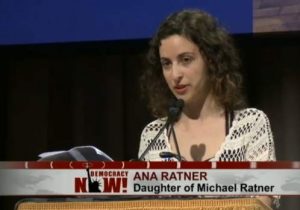
¡Michael Ratner Presente! was co-sponsored by Cooper Union, the Center for Constitutional Rights, Democracy Now!, National Lawyers Guild, The Nation Institute, Nation Magazine, Haymarket Books, and Voices of a People’s History of the United States.
Michael Ratner’s Politics – By Michael Smith
—————————————————————————–
Academic Freedom, CIA Sponsored Terror, Criminalizing Dissent, Crony Capitalism, Gaza, Human Rights, Prison Industry, War Resister
Podcast: Play in new window | Download
Update: Co-host Michael Smith’s Parrot Charlie Turns 25
—-
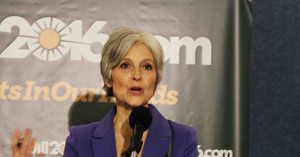
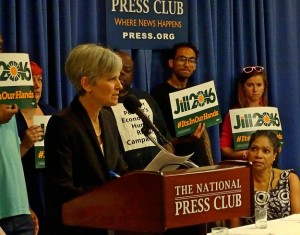
Green Party 2016 US Presidential Candidate Dr. Jill Stein
Jill Stein is a physician and activist who is seeking the Green Party’s 2016 presidential nomination. She ran for the White House as the Green Party’s candidate in 2012, winning nearly half a million votes. Stein is a graduate of Harvard College and Harvard Medical School.
Her campaign website urges: It’s time to build a people’s movement to end unemployment and poverty; avert climate catastrophe; build a sustainable, just economy; and recognize the dignity and human rights of every person. The power to create this new world is not in our hopes; it’s not in our dreams — it’s in our hands.
Guest – Dr. Jill Stein, was the Green Party’s 2012 candidate for president of the United States. She is an organizer, physician, and pioneering environmental-health advocate. She has led initiatives promoting healthy communities, local green economies and the revitalization of democracy – addressing issues such as campaign finance reform, green jobs, racially-just redistricting, and the cleanup of incinerators, coal plants, and toxics. She was a principal organizer for the Global Climate Convergence for People, Planet and Peace over Profit. Dr. Jill Stein is a mother, physician, longtime teacher of internal medicine, and pioneering environmental-health advocate. She is the co-author of two widely-praised reports, In Harm’s Way: Toxic Threats to Child Development, published in 2000, and Environmental Threats to Healthy Aging, published in 2009. The first of these has been translated into four languages and is used worldwide. The reports promote green local economies, sustainable agriculture, clean power, and freedom from toxic threats.
—-
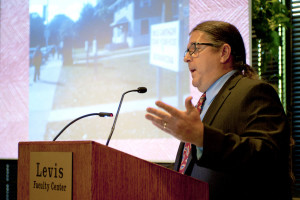
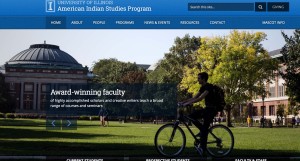
Department of American Indian Studies at the University of Illinois Reduced From Nine To Zero
Professor Robert Warrior is the departing chairman of the Department of American Indian Studies at the University of Illinois. Warrior is a member of the Osage Indian tribe of Oklahoma. He was the chairman of the department that help recruit Professor Steven Salaita to the University of Illinois in 2014. Salaita gave up his tenure in Virginia and was moving to University of Illinois when he was openly critical of the Israeli bombing of Palestinians in Gaza. For this, his tenured position at the University of Illinois was revoked. In the wake of Salaita’s firing, the Department of American Indian Studies at the University of Illinois had dwindled down to zero people from the nine it had just two years ago.
Guest – Professor Robert Warrior is Director of American Indian Studies at the University of Illinois at Urbana-Champaign, where he is Professor of American Indian Studies, English, and History. An enrolled member of the Osage Nation, he is the author of The People and the Word: Reading Native Nonfiction, American Indian Literary Nationalism (with Craig Womack and Jace Weaver), Like a Hurricane: The Indian Movement from Alcatraz to Wounded Knee (with Paul Chaat Smith) and Tribal Secrets: Recovering American Indian Intellectual Traditions. He is also a member of the Native Critics Collective, which published Reasoning Together, a collection of essays focused on Native literary criticism.
Members of the Native American and Indigenous Studies Association selected both The People and the Word and Reasoning Together for its list of the ten most influential books in Native and Indigenous studies in the first decade of the twenty-first century. He and the coauthors of American Indian Literary Nationalism were the inaugural recipients of the Beatrice Medicine Award for Scholarly Writing from the Native American Literature Symposium, and Warriorhas also received awards from the Gustavus Myers Foundation, the NativeAmerican Journalists Association, the Church Press Association, and others.
————————————————————————–
CIA Sponsored Terror, Civil Liberties, Gaza, Guantanamo, Habeas Corpus, Human Rights, Prison Industry, Surveillance, Targeting Muslims, Torture, War Resister
Podcast: Play in new window | Download
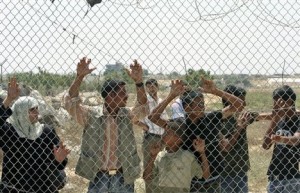
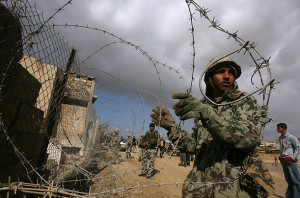
CCR Human Rights Group Returns From Israel
Executive Director of the Center for Constitutional Rights Attorney Vince Warren returned from Palestine Israel last month where he was accompanied by CCR Legal Director Baher Azmy and CCR Deputy Legal Director Maria LaHood. We talk with Vince Warren about what they saw, with whom they met, and the current activities of the CCR in support of the Palestinian people and human rights in Israel Palestine.
Guest – Vince Warren, Executive Director of the Center for Constitutional Rights. He oversees CCR’s groundbreaking litigation and advocacy work, which includes using international and domestic law to hold corporations and government officials accountable for human rights abuses; challenging racial, gender and LGBT injustice; and combating the illegal expansion of U.S. presidential power and policies such as illegal detention at Guantanamo, rendition, and torture. Prior to his tenure at CCR, Vince was a national senior staff attorney with the American Civil Liberties Union, where he litigated civil rights cases, focusing on affirmative action, racial profiling, and criminal justice reform. Vince was also involved in monitoring South Africa’s historic Truth and Reconciliation Commission hearings, and worked as a criminal defense attorney for the Legal Aid Society in Brooklyn. Vince is a graduate of Haverford College and Rutgers School of Law.
—-

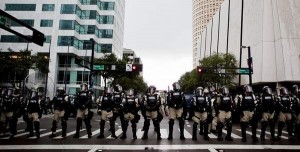
American Exceptionalism And The Proto-Fascist State
American exceptionalism is a term referencing the special character of the United States as a uniquely free nation based on democratic ideals and personal liberty. Our guest Todd Pierce has written about this and American militarism on sites such as MondoWeiss.com, Consortiumnews and Truthout. We’ll also talk with him about the Obama Administration’s expression of “American exceptionalism.” How has military rule degenerated the principles within U.S. Constitution? Todd Pierce points out that there is a continuity between the Obama Administration – today’s neoconservatives and the law under fascist Germany in the 30s and 40s.
Guest – Todd Pierce, retired Major in the U.S. Army Judge Advocate General (JAG) Corps in November 2012. His most recent assignment was defense counsel in the Office of Chief Defense Counsel, Office of Military Commissions. In the course of that assignment, he researched and reviewed the complete records of military commissions held during the Civil War and stored at the National Archives in Washington, D.C.
————————————-
Academic Freedom, Afghanistan War, CIA Sponsored Terror, Civil Liberties, Criminalizing Dissent, Gaza, Habeas Corpus, Human Rights, Iraq War, NSA Spying, Prosecution of the Bush Administration, Surveillance, Targeting Muslims, Torture, War Resister
Podcast: Play in new window | Download
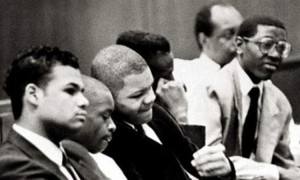

NYC Teacher Fired For Lessons About The Central Park Five
An English teacher at a New York City high school claims that she was fired because of a lesson on the so-called Central Park Five which school administrators warned her would “rile up” black students. Jeena Lee-Walker recently filed a lawsuit in federal court against the Dept. of Education and several administrators from the High School for Arts, Imagination and Inquiry after being fired for insubordination and poor evaluations. She claims they were the result of her pushing back on topics like the Central Park Five. Lee-Walker, who graduated from Barnard and has post-graduate degrees from Harvard and Fordham, began working at the school in 2013 and says she was told to be more “balanced” in covering the Central Park Five case in November of that year.
The lawsuit claims retaliation against her “violated her First Amendment right to discuss the Central Park Five case, and that the firing violated the city’s contract with the teacher’s union because she was not given a required 60 days notice.” As listeners may recall, the Central Park Five, who were wrongfully jailed for the 1989 rape of a Central Park jogger, received a $42 million settlement from NY City. In 2014, they sued the state seeking $52 million in damages for the emotional trauma of being incarcerated for years for a crime they were coerced into confessing to.
Guest – Attorney Ambrose Wotorson, a Brooklyn based attorney who is representing Jeena Lee-Walker in this case. He’s a trial lawyer focusing employment law and business litigation. Twitter account.
—-


Intelligence Matters: The CIA, the FBI, Saudi Arabia, and the Failure of America’s War on Terror
Retired Florida U. S. Senator Bob Graham was the head of the US Senate intelligence committee and also the chairman of the 9/11 commission of inquiry. He is the leading person trying to get President Obama to release to the public the suppressed 28 pages of the 911 report which have been hidden. Senator Graham contends that the 19 hijackers, 15 of whom who were Saudi Arabians, could not have pulled off the operation alone and that in fact they were part of a support network involving the Saudi Arabian monarchy and government which helped plan, pay for and execute the complicated 911 plot which, says Senator Graham, would have otherwise been impossible to accomplish. Senator Graham has written the book Intelligence Matters: The CIA, the FBI, Saudi Arabia, and the Failure of America’s War on Terror. It provides a candid insight to the workings of the US in Saudi relations and their implications on US foreign-policy making as it pertains to the middle east and bags tension, contemporary geopolitics.
Guest – Senator Bob Graham, is the former two–term governor of Florida and served for 18 years in the United States Senate. This is combined with 12 years in the Florida legislature for a total of 38 years of public service. As Governor and Senator, Bob Graham was a centrist, committed to bringing his colleagues together behind programs that served the broadest public interest. He was recognized by the people of Florida when he received an 83% approval ranking as he concluded eight years as Governor. Bob Graham retired from public service in January 2005, following his Presidential campaign in 2004.
—-


Saudi Arabia, Wahhabism and Middle East Geopolitics
We take a deeper look at Saudi Arabia and its relationship first United States and then to the other countries in the Middle East region.
Guest – Professor Rashid Khalidi, a Palestinian American who grew up in New York City. He teaches at Columbia University where he is the Edward Said Professor of Arab studies and the head of the Middle East Institute. He is the author of a number of books, most recently “The Iron Cage: The Story of the Palestinian Struggle For Statehood. He has written more than 80 scholarly articles on Middle Eastern history and politics as well as op-ed pieces in the New York Times, the Boston Globe, the Los Angeles times, the Chicago Tribune, and The Nation magazine.
—————————————————–



























